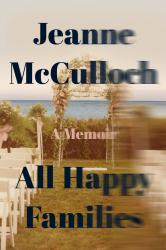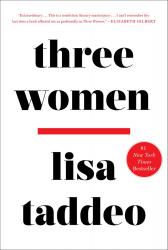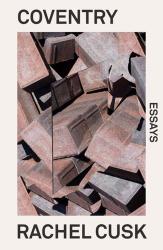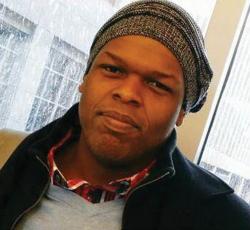
On Mother’s Day 2019, I take Mama to the home of her best childhood friend for dinner. Her friend’s family includes a sister, a brother, her friend’s father (still grinning in his midnineties), and numerous nieces, nephews, and cousins. Over a dozen people all told. They’re an outgoing, good-looking bunch. I can’t wander to any corner of the house and not find myself engaged in discussion about their hopes for the future or banter about the pleasures of retirement. The sister is a retired educator who enjoys the quiet of not being surrounded by moody teens all day. The brother bought a luxury car and took up golf. One of the nephews plans to support his infant son by getting promoted at a food distributorship. But his real dream is to build houses one day.
 Mama and I find ourselves at this event because what is Mother’s Day but the celebration of family? Only our family is in tatters. Her parents passed decades ago. Her brother is in a psychiatric ward in a nursing home in central Louisiana. My brother lives in Georgia and rarely returns home. My dad died during the Obama administration, and I don’t have children. Not long after our arrival—before dessert is served—I suggest that we leave. The joy is strong here, and it feels lent, not owned. She agrees. Not much later, I watch her walk the lane up to her little third-floor apartment, carrying a plate of Chantilly cake wrapped in foil.
Mama and I find ourselves at this event because what is Mother’s Day but the celebration of family? Only our family is in tatters. Her parents passed decades ago. Her brother is in a psychiatric ward in a nursing home in central Louisiana. My brother lives in Georgia and rarely returns home. My dad died during the Obama administration, and I don’t have children. Not long after our arrival—before dessert is served—I suggest that we leave. The joy is strong here, and it feels lent, not owned. She agrees. Not much later, I watch her walk the lane up to her little third-floor apartment, carrying a plate of Chantilly cake wrapped in foil.
 In 1983, my parents purchased a ranch-style house in the suburbs east of New Orleans. Apparently, in the years before we arrived, developers had plans for an ambitious complex of neighborhoods. The plans were so ambitious that the federal government built new exit ramps from I-10. But the project never reached fruition. The additional neighborhoods were never built. To this day, the cloverleaf exits northeast of our old suburb dead end to Bayou Sauvage, a wildlife refuge.
In 1983, my parents purchased a ranch-style house in the suburbs east of New Orleans. Apparently, in the years before we arrived, developers had plans for an ambitious complex of neighborhoods. The plans were so ambitious that the federal government built new exit ramps from I-10. But the project never reached fruition. The additional neighborhoods were never built. To this day, the cloverleaf exits northeast of our old suburb dead end to Bayou Sauvage, a wildlife refuge.
But for about half a decade in the 1980s, we were a nuclear family. My parents, my older brother, and me. Because I was a child in Reagan-era America, a time when cartoons were mostly about teams of good, perfect people fighting teams of bad, flawed people (G.I. Joe, Transformers, Care Bears, Rainbow Brite, etc.), I saw my family as a team. Only we were far from perfect. We had shouting matches. We threw dishes. We kicked in doors. We wrecked cars while drunk. Flawed we were, but we hid those flaws within the four walls of our home as best we could.
Jeanne McCulloch’s fascinating new memoir, All Happy Families, explores the myth that happy families exist at all. Tolstoy’s oft-repeated saying that every unhappy family is unhappy in its own way is deftly demonstrated within these pages. On the surface, McCulloch’s upper-crust New York family has every reason to be happy. In the 1970s, they live in a posh condo on the Upper East Side, go on safari in Africa—where the family patriarch converses with the locals in Swahili—and summer at their beachfront home in the Hamptons. But as a girl, McCulloch, who would later become an editor for the Paris Review and Tin House, is squeamish about revealing her family’s privilege to others: “The thing I lied about with frequency was my address.” McCulloch avoided telling the curious that she grew up at the top of a duplex on Park Avenue. In later scenes, her family will travel from Manhattan to Long Island where, at their summer home, their chef, Johanna, will have minor territorial squabbles with their housekeeper and their gardener. But McCulloch’s mildly conflicted feelings regarding her economic privilege is mostly glossed over.
The memoir is not about a clan of rich people living it up, but about her family. The core of that family, her mother, is Mrs. McCulloch, regnant of their sprawling beach house called Children at Play. The book starts with Mrs. McCulloch walking into the sea. In a more dramatic narrative, this might signal that the memoir will contain shades of Victorian-era drama. To the contrary, the matriarch enters the water because that is her summertime routine. McCulloch is aware of these clichés and steers into them because they reflect certain truths about her mother. Referring to her mother as a charter-member limousine liberal, McCulloch writes, “When I think of my mother in that era, by day she is disappearing into a hired black limousine, her Hermès scarf tied neatly over her head, off to tutor young children in an East Harlem storefront.”
Yet, her mother comes to life when presented directly. Initially, she comes off as pathologically self-centered. Much of the first third of the book swirls around Mrs. McCulloch’s attitudes about marrying well. She uses the Social Register, a listing of New York’s elite, as a guide to select a mate for her daughter. And when McCulloch chooses to marry a young man not in the register, her mother labels him as a mere college fling not worthy of long-term commitment, in her opinion. As the wedding nears and the author auditions wedding dresses, Mrs. McCulloch exerts even more control. When the bride-to-be complains that she is the one getting married not her mother, Mrs. McCulloch responds in typical fashion: “It can be yours all you want when you pay for it. Your second wedding can be your wedding, because you’re not getting a second one out of me. This one is mine.” Early in the memoir, Mrs. McCulloch commands her estranged husband to sober up for their daughter’s wedding. After quitting cold turkey, he promptly suffers a stroke that leaves him comatose. On the night of the wedding, Mrs. McCulloch calls her husband’s physician with a shocking demand. She tells the doctor, “Why don’t you stop talking and listen to me? If anything happens to my husband this evening, do not call this house…. We cannot be disturbed, though. We are having a party.”
It’s not until the second part of the book that the author places her mother’s seeming cruelty in relief. It is here we encounter the family of the author’s husband, Dean. Dean’s father, Raymond Jackson, has fallen in love with his much younger coworker. Raymond convenes his large family to tell them that he is leaving their mother, Helen, after decades of a seemingly perfect marriage. As the grown children mount a defense of their mother and excoriate their father, it becomes clear that their mother isn’t enraged or accepting of her husband’s affair and upcoming desertion. In fact, she has no opinion other than their father’s. The children realize, to their horror, that their mother is a doormat.
In this manner, the author demonstrates the ways that women of that generation contorted themselves to patriarchal expectations. Mrs. McCulloch bucked those expectations by maintaining a fierce sense of self and family. She was never one to be dominated by anyone, let alone a man.
In Lisa Taddeo’s astonishing, deep-dive reporting on the lives of her subjects in Three Women, the lead characters seem trapped orbiting the men in their lives. Taddeo discloses that she spent years visiting Maggie, a waitress in North Dakota; Lina, a homemaker in Indiana; and Sloane, a restaurateur in Rhode Island. Taddeo gathered information via extensive one-on-one interviews, court transcripts, and text messages. She deploys novelistic technique to create a fluid and engrossing trifold narrative. When we first encounter Maggie, she is attending the trial of her former high school English teacher. She’s accused him of raping her when she was a student. She’s gained weight and become a pariah in her community. Meanwhile, he’s just won teacher of the year.
For six years, he stayed away. But he will come today, and he will come also to the trial, so in a way, it can be said that one of the reasons you’re doing this is because it means you’ll see him about six more times. This is an outlandish notion if you don’t know how a person can destroy you by the simple act of disappearing.
On first appearance, Lina is a normal teenager: overly body conscious and utterly infatuated with a popular boy at school. When the boy provides a small amount of attention, she thinks she is special. “It’s like being a display lamp in a lighting store that wasn’t plugged in but now is: suddenly customers are slowing down and going, Hey honey, how about this one?” Lina tries to make the boy jealous by going to the party of an older boy where she is assaulted and raped by three attendees.
Sloane is in her forties, slim, attractive, successful, and drawn to the buzz of the service industry. But she’s more attracted to nights that take unpredictable turns. When her husband suggests they add an additional partner to their lovemaking, she agrees. She has conflicted feelings about these evenings.
This is how you deal with watching your husband with another woman. You need to have a buzz but you cannot be drunk. If you are too drunk, then you will get irrationally jealous. You will stop making sense of things. You will not have the part of your brain that says, No, he loves you, he is just doing this for fun.
Taddeo’s book is primarily about the different forms women’s desires take. Indeed, the prologue includes an exploration of her own mother’s desire. As a young woman in 1960s Italy, her mother was followed each morning by an elderly man who masturbated in her presence. Taddeo is perplexed by why her mother never stopped the man until she considers the things she’s let men do to her. She also considers her mother’s sexuality, which never seemed quite real to Taddao. “To me, it always seemed a strength or a weakness, but never its own pounding heart. How wrong I was.”
Taddeo is a talented stylist using a different literary voice for each of the three women’s sections. Maggie’s passages possess a plainspoken poetry. “Maggie’s destiny arrives one afternoon without a clarion call. It comes on cat feet, like everything in the world that has the power to destroy you.” Lina’s narrative is shaped by sentences that are sexually charged or humorous and sometimes both. After estrangement from her husband, she reconnects with an old flame. “She tries pushing him against the wall but he’s a trunk and doesn’t move and this turns her on so much. She could throw her husband up a stairwell.” And Sloane’s hedonism is readily apparent in every scene in which she appears. “This sea bass, she said, touching Keith’s wrist. This fucking fish! There was something about food—there always had been—that connected Sloane to a different world, one where she didn’t have to be pretty and poised. A world where juices could run down her chin.”
Rachel Cusk’s formidable, idiosyncratic style is on display throughout her first collection of essays, Coventry. Many aspects of domesticity and femininity come under her scrutiny. In “Aftermath,” she considers her recent divorce and the freedom it affords her in juxtaposition to the women who stay within the confines of matrimony like her mother. Describing a wedding photograph of her mother she writes, “There she stood in white, the sacrificial victim: a narrow-waisted smiling beauty, as compact as a seed…That beauty was gone now, all used up, like the oil that is sucked out of the earth for the purpose of combustion.”
Cusk aligns manhood with civilization and womanhood with paganism. She prefers the latter as she explains while recalling her history teacher who loved the Dark Ages and “liked the women who accrued stature in those formless inchoate centuries…the personal level on which issues of justice and belief had now to be resolved, in the absence of that great administrator civilization.”
In “Lions on Leashes,” she examines child-rearing. Cusk summons forth the story of Medea, who kills her own children not because she hates them but to avoid being left alone to complete the task while her husband frolics about with a younger woman. She connects this story to the power that parents have over children. While children may be rude and unruly, they can and should be tamed. But this taming must be balanced with respect for the child, to consider their desires and autonomy. She was raised in an environment where children received all the respect of herd animals. “Respect is something I have had to learn, like French. It feels good to talk in French; the more I speak it, the more I improve.”
In the title essay, Cusk explores the effect of the difficult past on the present. She uses the town cathedral, which was bombed during World War II, as a metaphor for the dissolution of her first marriage. Her stifled parents are afraid to speak about the destroyed world they were raised in, but Cusk believes she must be honest with her own children about the nature of their family’s past. She refuses to speak to her parents, but encourages her children to communicate with them. This only confuses her children.
These are old things, old arguments, old people: it’s so much ancient history. It is as though a moss-encrusted monument had suddenly tried to explain itself to them. I say to them, the thing about time is that it can transform the landscape without improving it. It can change everything except what needs to change.
In the second half of the collection, Cusk muses on creativity and the meaning of story-telling in classic and contemporary fiction. In “Shakespeare’s Sisters,” she challenges the notion that women need a room of their own to produce writing, noting that both Jane Austen and Emily Brontë shared living space with others. She sees the room of her own paradigm as enabling “the woman writer to shed her links with femininity and commit herself to the reiteration of “masculine values.” In other words, having a room of one’s own allows women to forsake all their other responsibilities in pursuit of art, a strategy often attributed to men.
Finally, in her review of Eat, Pray, Love, Cusk argues that the author’s journey is an exercise in self-aggrandizement. “Elizabeth Gilbert is a relentless cataloguer of such successes, social, gastronomic, spiritual and sexual…. This voyage of self-discovery, it turns out, was a competition, at whose heart is a need to win.” Cusk suggests that Gilbert might have been better served embracing the life she left and trying to improve it. “But to say that, of course, would be to take it all much too seriously.” Gilbert was looking for followers not freedom.







